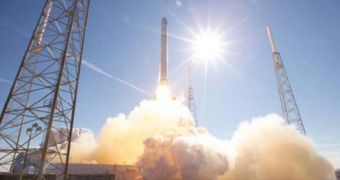Officials at the Hawthorne, California-based Space Exploration Technologies Corporation (SpaceX) have brought Herndon, Virginia-based Valador Inc. to court, over claims the latter made that the SpaceX Falcon 9 rocket experienced a malfunction during its second flight.
Valador Inc. and its vice president, Joe Fragola, expressed their concerns about the medium lift delivery system's performances and safety in a letter they sent to Bryan D. O’Connor, who is the chief of Safety and Mission Assurance at the American space agency.
NASA is in direct control of the funds on which SpaceX operates, under the provisions of the Commercial Orbital Transportation Services (COTS) agreement the two signed. As such, any hints that Falcon 9 or the unmanned space capsule are unsafe could damage progress.
Valador Inc.'s Joe Fragola said in his email to the NASA official that he heard about a rumor concerning a possible failure that affected the SpaceX rocket during its second flight, which the latter company deemed a success.
“I have just heard a rumor, and I am trying now to check its veracity, that the Falcon 9 experienced a double engine failure in the first stage and that the entire stage blew up just after the first stage separated,” he wrote in the email, Space reports.
“I also heard that this information was being held from NASA until SpaceX can 'verify' it,” he added in the letter. SpaceX considered these to be defamatory allegations, and brought the other company to court in the Fairfax County Circuit Court of Virginia on June 14.
The California corporation says that the second test flight of the Falcon 9 was an absolute success. During the mission, the Dragon space capsule was deployed for the first time. The spacecraft did four orbits around Earth, before reentering the atmosphere and landing in the Pacific Ocean.
“First, there was no ‘double-engine’ failure (nor even a single engine failure). As planned, two of the nine first-stage engines shut down automatically ten seconds before the first stage shut down,” SpaceX officials write in their complaint.
“Second, the first stage did not 'blow up' after separation from the second stage and spacecraft. The launch was broadcast by a camera on the Dragon spacecraft, which vividly showed the separation of the first stage – and no explosion occurred,” they add.
“Furthermore, the first stage was, at all times, tracked by ground telemetry including by NASA. No systems observed any "explosion" of the first stage. As an 'expert,' Fragola should have known the notion of the first stage 'blowing up' was abjectly untrue,” the SpaceX document concludes.
Fragola is regarded as an expert in human spaceflight safety. He is a member of the NASA Exploration Systems Architecture Study team, and was directly involved in selecting the ARES I and V delivery systems for construction under Project Constellation back in 2005.

 14 DAY TRIAL //
14 DAY TRIAL //